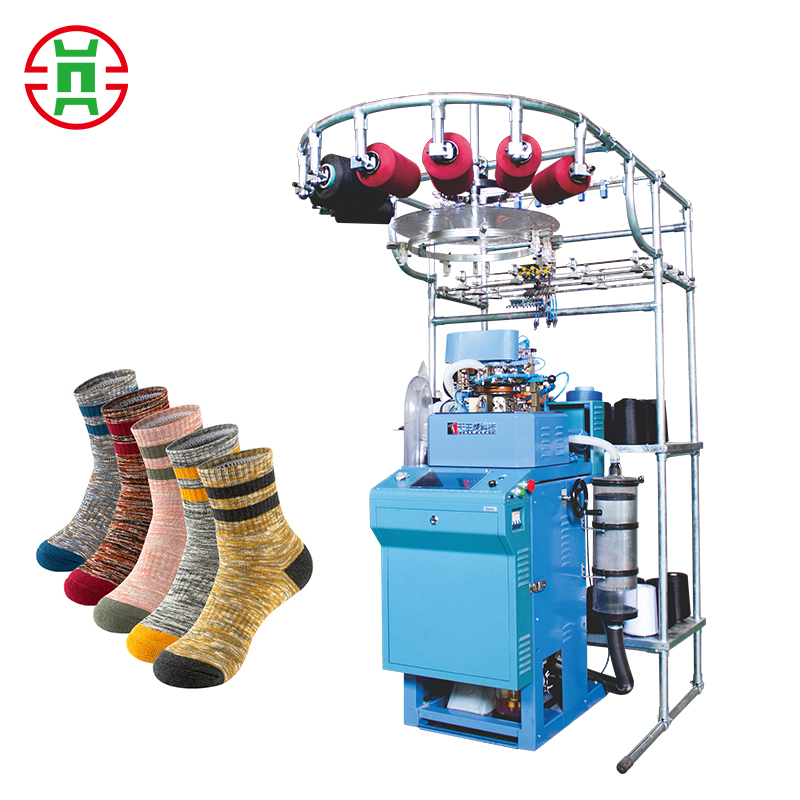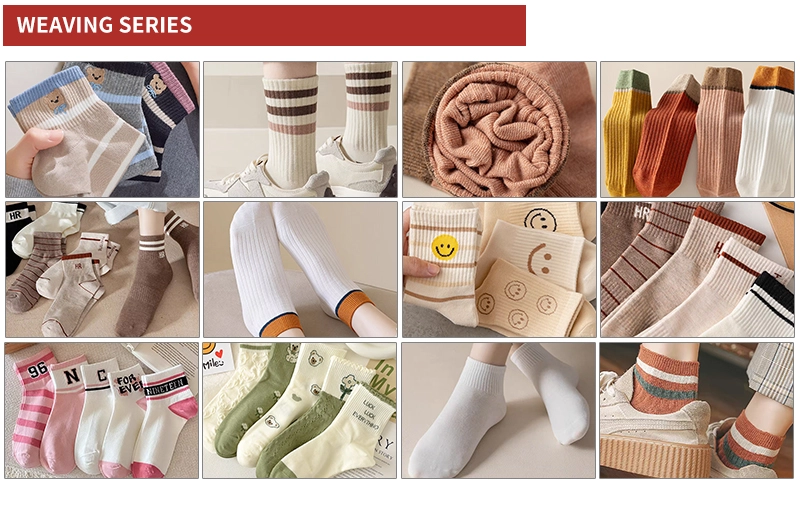In the bustling textile hubs of Pakistan, from Faisalabad to Sialkot, the demand for efficient sock production tools is skyrocketing. If you’re searching for “socks knitting machine price in Pakistan,” you’re likely an entrepreneur eyeing a profitable venture in garment manufacturing. Whether you’re starting a small-scale sock business or scaling up an existing operation, understanding the costs, features, and benefits of these machines is crucial. Prices can vary widely, from as low as PKR 190,000 for basic used models on platforms like OLX Pakistan 0 to over PKR 450,000 for more advanced ones 9 . But beyond the price tag, what really matters is how these machines can transform your production line. In this comprehensive guide, we’ll dive deep into the world of sock knitting machines, explore market prices in Pakistan, and highlight why investing in high-quality equipment from trusted manufacturers like Changhua can be a game-changer for your business.
As a reader interested in this topic, you might be wondering: Is now the right time to invest in a socks knitting machine? With Pakistan’s textile industry contributing significantly to the economy and a growing export market for apparel, yes—it could be. We’ll cover everything from basic mechanics to advanced models, and even recommend specific options that fit the Pakistani market. Let’s get started.
What is a Socks Knitting Machine?

A socks knitting machine is a specialized piece of equipment designed to automate the production of socks, transforming yarn into finished products with minimal human intervention. These machines use circular knitting technology, where needles arranged in a cylinder knit the fabric in a seamless loop, perfect for creating tubular shapes like socks. Unlike traditional hand-knitting or flat-bed machines, sock knitting machines are optimized for high-speed, repetitive production, making them ideal for commercial use.
History and Evolution of Sock Knitting Machines
The origins of knitting machines date back to the 16th century with the invention of the stocking frame by William Lee in England. Fast-forward to today, and modern sock knitting machines are computerized marvels capable of producing hundreds of pairs per day. In Pakistan, where the textile sector employs millions, these machines have become essential for small and medium enterprises (SMEs) looking to compete globally.
From manual looms to fully automatic models, the evolution has focused on speed, precision, and versatility. Early machines were labor-intensive, but today’s versions incorporate digital controls for pattern customization, yarn feeding systems, and even elastic insertion for terry socks or sportswear. If you’re new to this, imagine a machine that not only knits but also links heels and toes automatically—saving you hours of manual labor.
Basic Mechanics of a Sock Knitting Machine
At its core, a sock knitting machine operates on the principle of loop formation. Yarn is fed through a tension device into a needle bed, where hooks on the needles catch and interlock the yarn to form stitches. The machine’s dial and cylinder rotate to create the sock’s body, heel, and toe.
Key components include:
Needle Cylinder and Dial: The rotating parts where knitting happens. Diameters typically range from 3 to 4.5 inches for adult and children’s socks.
Yarn Feeders: Multi-feeder systems allow for color changes and patterns. High-end models support up to 16 feeders.
Computer Control Panel: For programming designs, speeds (up to 350 RPM), and sizes.
Linking and Boarding Devices: Automatically close the toe and shape the sock.
Types of Socks Knitting Machines Available in Pakistan
In Pakistan’s market, sock knitting machines come in various types to suit different budgets and production needs. From OLX listings to Daraz imports, you’ll find options ranging from used Chinese models to brand-new automatic ones 1 . Let’s break them down.
Manual vs. Semi-Automatic vs. Fully Automatic Machines
Manual Sock Knitting Machines
These are the entry-level options, often hand-cranked or pedal-operated. They’re affordable, with prices starting at PKR 50,000-100,000 on local classifieds, but require skilled operators and produce only 20-50 pairs per day. Ideal for home-based setups in rural Pakistan, but not scalable for exports.
Semi-Automatic Machines
A step up, these handle knitting automatically but need manual linking. Prices hover around PKR 150,000-300,000. They’re popular in Sialkot’s small factories, offering better efficiency than manuals without the full automation cost.
Fully Automatic Sock Knitting Machines
The gold standard for modern production. These machines knit, link, and board socks autonomously, with speeds up to 400 pairs per day per machine. In Pakistan, new models cost PKR 400,000-1,000,000 or more, depending on features. Used ones on Facebook groups can be found for PKR 190,000 8 . They’re perfect for businesses targeting international markets like the EU or US, where quality consistency is key.
Benefits of Investing in Automatic Sock Knitting Machines for Pakistani Businesses
For small businesses in Pakistan, automatic sock knitting machines offer transformative advantages, especially amid rising labor costs and export demands 10 . Let’s explore why they’re a smart choice.
Increased Production Speed and Efficiency
Manual methods produce 50-80 RPM, but automatic machines hit 200-500 RPM, churning out 300-500 pairs daily 11 . In Pakistan’s competitive market, this means meeting deadlines for bulk orders from brands like Nike or local exporters.
Cost Savings on Labor and Materials
One operator can manage 10-15 machines, reducing labor needs by 70%. Precision minimizes yarn waste, saving 20-30% on materials. For SMEs starting with PKR 5 million investment, this ROI is quick 18 .
Versatility in Designs and Customization
From plain cotton socks to patterned athletic ones, these machines support multi-yarn feeders for endless designs. In Pakistan, where fashion trends evolve fast, this versatility caters to diverse markets like school uniforms or sports gear 14 .
Energy Efficiency and Sustainability
Modern models reduce power consumption by up to 30%, aligning with Pakistan’s energy challenges. They also produce seamless socks with minimal waste, appealing to eco-conscious buyers.
How to Start a Sock Manufacturing Business in Pakistan
Launching a sock manufacturing venture in Pakistan is straightforward with the right planning. The textile sector’s growth, supported by government incentives, makes it promising 19 .
Step-by-Step Guide to Setting Up
Step 1: Market Research and Business Plan
Assess demand—Pakistan’s sock market is booming with urbanization. Target niches like organic cotton socks. Initial investment: PKR 2-5 million for machines and setup 18 .
Step 2: Legal Registration and Compliance
Register with SECP for PKR 1,000-10,000. Obtain environmental clearances from PEPA if scaling up 17 . Labor registration costs PKR 1,000.
Step 3: Sourcing Equipment and Raw Materials
Buy machines from reliable suppliers. Yarn from local mills in Faisalabad keeps costs low.
Step 4: Funding Options
Use personal savings or bank loans from institutions like HBL. Government schemes for SMEs offer low-interest funding 16 .
Step 5: Location and Setup
Choose industrial areas like Sialkot for logistics. Start small with 5-10 machines.
Step 6: Marketing and Sales
Export via platforms like Alibaba or sell locally on Daraz. Focus on quality certifications for international appeal.
Introducing Changhua: Your Trusted Partner in Sock Knitting Machinery
If you’re serious about your sock manufacturing business in Pakistan, it’s time to consider a reliable manufacturer like Changhua. As a leading name in the industry—often referred to as Changhua sock machine experts—our company, Changhua Knitting Machine, has been delivering top-tier equipment for over two decades. Visit our official website to explore our full range. We specialize in automatic sock knitting machines tailored for global markets, including Pakistan, where our durable, high-efficiency models have helped numerous SMEs thrive.
What sets Changhua apart? Our machines are built with precision engineering from Taiwan, ensuring longevity and minimal downtime. We’ve embedded Changhua sock machine technology into countless production lines worldwide, and we’re proud to offer competitive pricing without compromising quality. If affordability and performance are your priorities, Changhua is the way to go.
Spotlight on Our 3.5-Inch Automatic Socks Knitting Machines
Among our most sought-after products are the 3.5-inch automatic socks knitting machines, detailed on this dedicated page: https://www.changhua-knitting-machine.com/3-5-inch-automatic-socks-knitting-machines.html. These models are engineered for women’s and youth socks, a high-demand category in Pakistan’s market.
Key Features of the 3.5-Inch Models
Our 3.5-inch series includes variants with cylinder diameters optimized for fine-gauge knitting (up to 176 needles). They support elastic yarn insertion for fitted socks and have a production capacity of 250-350 pairs per day. The machines come with USB pattern import for quick design changes, and their modular design allows easy upgrades.
Technical specs:
Power: 0.75 KW, suitable for Pakistan’s voltage fluctuations.
Dimensions: 80x50x60 cm, space-saving for small factories.
Weight: 150 KG, easy to transport.
These machines excel in producing seamless, durable socks with minimal defects, thanks to our advanced sensor technology that detects yarn breaks automatically.
| Product name | 3.5 Inch Automatic Socks Knitting Machines |
| Model | SZ-6FP |
| Cylinder Diameter | 3.5 inch |
| Needle Number | 54-220N |
| Highest Speed | 350 Rpm/min |
| Running Speed | 250 Rpm/min |
| Power Requirement | Drive motor 0.85 KW |
| Power Requirement | Fun motor 0.75 KW |
| Power Requirement | Control box 0.8 KW |
| Rated Voltage | 220V/380V/415V |
Production Capacity and Applications
With a speed of 320-380 RPM, our 3.5-inch machines are ideal for startups aiming for 8,000-10,000 pairs monthly. In Pakistan, they’re perfect for school socks or casual wear, aligning with local textile trends.


Advantages of Choosing Our Changhua Machines
Why opt for our Changhua sock machines over generic imports? Here’s what makes us stand out:
Superior Durability and Build Quality
Our machines use high-grade alloys and Taiwanese components, lasting 10+ years with proper maintenance—far outpacing cheaper alternatives that break down frequently. In Pakistan’s humid climate, this rust-resistant design is a boon.
Advanced Technology for Precision and Customization
With computerization, our models ensure 99.9% consistency in stitch quality, reducing returns. Features like 3D knitting simulation allow for innovative designs without waste 10 .
Cost-Effectiveness and Energy Savings
While initial prices are competitive (contact us for quotes tailored to Pakistan), the long-term savings are immense: 30% less energy use and 50% faster production. One skilled operator handles multiple units, slashing labor costs 11 .
Excellent After-Sales Support
We provide free installation guides, video tutorials, and a 1-year warranty. For Pakistani customers, we offer spare parts shipping and remote troubleshooting via our website. Plus, our machines comply with international standards, easing export certifications.
Tailored for the Pakistani Market
Our Changhua sock machines are optimized for local yarns and power supplies, with models that handle cotton blends prevalent in Faisalabad. We’ve helped over 50 Pakistani businesses scale up, proving our reliability.
Maintenance Tips for Your Sock Knitting Machine
To maximize your investment:
Daily Cleaning and Lubrication
Wipe needles and oil moving parts to prevent jams.
Regular Software Updates
Our machines support easy USB updates for new patterns.
Troubleshooting Common Issues
Yarn tension problems? Adjust feeders per our manual. For in-depth guides, download our free PDF maintenance handbook.
Why Wait? Contact Changhua Today for Your Quote
If this guide has sparked your interest in starting or upgrading your sock production, why not reach out to us at Changhua? Our sock machines are designed to deliver results, and we’re here to help tailor a solution for your Pakistani business. Visit our website for a personalized quote. Don’t miss out—invest in Changhua and step up your game today!

English
العربية
Français
Русский
Español
Português
Deutsch
italiano
日本語
한국어
Nederlands
Tiếng Việt
ไทย
Polski
Türkçe
ភាសាខ្មែរ
Bahasa Melayu
தமிழ்
Filipino
Bahasa Indonesia
magyar
Română
Čeština
қазақ
Српски
हिन्दी
Kiswahili
Slovenščina
Norsk
Svenska
українська
Ελληνικά
Suomi
עברית
اردو
Shqip
বাংলা
Hrvatski
Gaeilge
Māori
සිංහල
नेपाली
Oʻzbekcha
Aymara
Azərbaycan dili
Беларуская мова
Български
guarani
Lietuvių
Runasimi
Türkmençe






